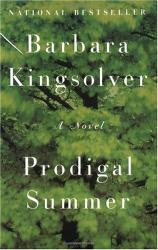Prodigal Summer: A Novel
Review
Prodigal Summer: A Novel
The constant hum of the forest permeates every page of Barbara Kingsolver's novel, THE PRODIGAL SUMMER. With insects incessantly buzzing, twigs snapping, animals scurrying, leaves whispering, birds squalling, moths mating, it's as if hundreds of different languages are being spoken all at once. The forest is not a quiet place, and THE PRODIGAL SUMMER is not a quite novel.
Before delving into the many merits of this book, I must first set down my one complaint. Several times during my initial reading I felt an odd sensation of being preached to, admonished and yet at the same time educated. Kingsolver almost goes over the top with what I'm calling her "agenda," her thoughts on the fragility and vulnerability of nature at man's mercy, that come through the voices of her main characters. But despite this, her characters' passion and zeal ring true more often than not, especially because the novel takes place in southern Appalachia, Kingsolver's old stomping ground, both in fiction and in life.
Each chapter of the book deals with one of the three main characters and are subsequently titled, Predators, Moth Love, and Old Chestnuts. Forty-something Deanna, the predator lover, has left her small town life in the Zebulon Valley and now lives alone as a forest caretaker. Lusa, the moth lover, is a new bride who suddenly finds herself saddled with a farm and a family of strangers. Garnett, the chestnut lover, is an embittered old man who pines away for companionship and the extinct American Chestnut tree. Through the voices of Deanna and Lusa, Kingsolver's message reverberates through the towering trees and farming fields --- do not mess with nature or any of its creatures, big or small, and do not ever spray pesticides. Garnett, on the other hand, stands for destruction with his spray happy hands.
One of the characters who has a flair for speeches is Nanny, Garnett's elderly neighbor and nemesis. A foil to Garnett, Nanny's character is replete with Mother Nature images. She is a quaint and quirky looking old lady, complete with braided buns, old-fashioned dresses, the occasional pair of short pants, and a very independent lifestyle. Nanny prides herself on being solely organic, while Garnett only feels comfortable dousing his plants with chemicals --- both feel the other's farming habits endanger their own. When his wife dies eight years before the novel's start, there is nothing to distract Garnett and he funnels his anger into sanctimonious rage upon Nanny, who fires back by sabotaging his efforts at spraying. They are a comical couple, but at times feel less substantial than the other characters, especially Nanny, who we don't get to know nearly as well.
Luckily, the many gorgeous, lush and sensual moments overpower any agenda in this novel. It's a long, languid summer brimming and at times overflowing with erotic fecundity. Nature is working double time to spread its bounty --- honeysuckle bushes overcome barn walls, scrotal shaped "lady's slipper" orchids blossom erotically in the forest, apples hang heavy from Nanny's boughs. The most beautiful images though are found in Lusa's love --- moth love. A career entomologist before she left the city to marry her farmer husband, Lusa continues to read about and study her favorite insects. She is especially fascinated at how moths use the language of scent to find one another, similar to pheromones in humans, and some even mate until death. These specific moths don't have mouths so they cannot speak nor eat. Their sole mission is to procreate, and they do so with abandon.
Coyotes are the other beautiful creatures at the center of the novel, appearing suddenly and disappearing just as fast, feeding rumors that frighten farmers and rally hunters from all over the country. Deanna dreams of finding the coyotes to prove that they exist and to celebrate the life they have managed to salvage despite man's attempt to drive them into extinction. In the first few pages of the novel Deanna meets one of those men, a wanderer from the West who has his gun handy, and whose mission she fears is to hunt the very thing she reveres. But even their tremendously different animal morals cannot squelch their immediate physical attraction, a lust for life that triggers her own internal war between body and mind.
The three storylines --- Deanna's search for the elusive coyote, Lusa's for a home, and Garnett's for his beloved chestnuts --- stream together side by side, sometimes skimming each other's boundaries. A chair in Deanna's chestnut cabin used to be in Lusa's home. Nanny once loved Deanna's father, and Garnett has a secret of his own that connects him to Lusa. Pheromones fly, coyotes howl, moths mate, humans bleed their emotions all over the tracts of land and forest during Kingsolver's prodigal summer.
Reviewed by Dana Schwartz on January 19, 2011
Prodigal Summer: A Novel
- Publication Date: October 1, 2001
- Genres: Fiction
- Paperback: 464 pages
- Publisher: Harper Perennial
- ISBN-10: 0060959037
- ISBN-13: 9780060959036










